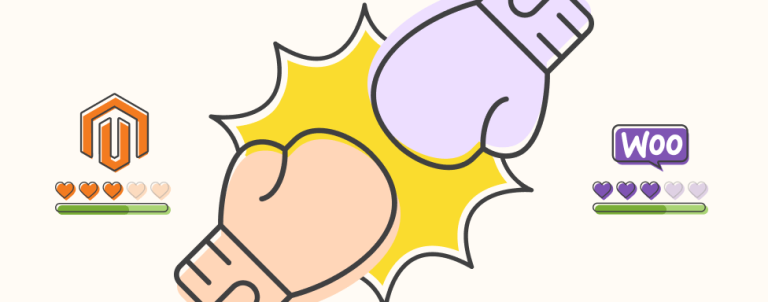If you have been involved in building your eCommerce website on Magento, you’ve probably come across some frictions between designers, frontend developers and online marketing team (I’ll leave out all other possible connections for the time being). Why?
Because, more often than not, the UX/UI designers on the project are “outsiders” who may have some great work behind them, but lack eCommerce and, in particular, Magento knowledge.
Now, is that even important? Should a designer understand the platform they’re designing for? And, let’s push that even further – should your designer be Magento certified?
Designer and a Magento Certified Solution Specialist? What kind of sorcery is this?
Our designers are Magento Certified Solution Specialists – we have made this expectation early on, and they have jumped on this opportunity. Why?
The designers are becoming an increasingly important piece of the puzzle in any customer-facing digital project, as they have to marry the analytical with creative thinking, because, at the end of the day, it is their work that will dictate how a brand will be perceived by key audiences.
So, in order to plan and deliver the goods as a designer, they have to understand the client’s business, their customers, but also the platform that is going to be used to develop the final solution.
How does certification actually help?
Magento Certified Solution Specialists are individuals who have comprehensive understanding of the entire eCommerce process and the inside-out knowledge of Magento as the most popular open-source eCommerce platform.
The certification is aimed at various non-technical roles that are integral to the success of an eCommerce project, and people who mostly get certified are eCommerce Managers, Consultants, Project Managers, Account Managers, Data Analysts, and, in our case – UX Designers.
During the certification process, they need to demonstrate knowledge of Magento as a platform from both functional and architectural perspective, and match that to the overall understanding of key processes and steps in creating a solid eCommerce solution.
How is the project different when designers are Magento certified? What’s the added value?
The designers add value to eCommerce projects very differently, depending on what their background and experience is, and what expectations are set before them. Usually, it comes down to a hit-and-run engagement, but we prefer to have the designers immersed throughout the project.
This is because they can add so much more value, but only if they bring in the goods. So, what exactly can (and should) be different?
Designers without eCommerce or Magento experience (freelance or agency-sourced):
- are not involved in the entire project
- usually deliver the visuals and off they go
- are usually not available for discussions with frontend team (frontend needs to work around the files they have delivered)
- don’t consider the big picture
Designers who are Magento Certified Solution Specialists:
- get involved in the early stages (starting with planning)
- understand the constraints of the platform (they know how much extra work some of their UX decisions may mean in the development phase)
- make customization decisions together with PMs and development team to ensure they add value where ROI will be the highest
- work alongside developers, not against them
- contribute constantly throughout the project lifecycle
What do key persons in an eCommerce project say?
Now, how about we hear it from some of the key people involved in eCommerce project delivery:
The Project Manager
The main issue I see with having designers with little to no eCommerce or Magento experience being involved is managing client expectations. When the client has already signed off on a design prepared by a third party, it is very difficult to get them back to the drawing board about certain workflows, specific features and, in particular, budget implications, and they are usually there.
We prefer to have designers as an integral part of the team from Day 1, so they can be involved and make joint decisions on UX as those always affect the entire project.
– Ivan Galić, Project Manager
The Developer
It is much easier working alongside designers who understand the platform. They don’t go into some new UX concepts without discussing it with the rest of the team and talking about the benefits vs the costs involved.
When we have worked with outside designers who “knew UX” but didn’t know basic eCommerce principles or Magento as a platform, we’ve engaged in endless discussions, communication was a mess, and things often escalated into a blame game that doesn’t really help the client.
Additionally, we often needed to resort to certain functional “hacks” in order to match the designs as that was specifically required. I would always advise the merchants to get the UX designers with at least some prior experience in eCommerce projects and on the platform for which they should design.
– Hrvoje Jurišić, Lead Frontend Developer
The Client
We loved the process of Inchoo designers, who were very active from the very beginning in analyzing the old website and identifying various UX problems. They worked alongside the developers to create overall website architecture and set the foundations for the new layouts, even before any sketches were made. I’d say that the biggest gain from having designers with Magento knowledge was their focus on making user-oriented decisions that will bring in the biggest results for us as a client.
– Damir Vučkovac, Client (owner of Shop4Runners)
The Certified Designer Herself
I don’t believe designers must be certified at any cost to be able to create quality eCommerce design, but in the Magento world it is such an advantage to know exactly when you’re adding additional cost to the project estimate by modifying any part of the store.
I do firmly believe however, if designers want to be included in the conversation dealing with how the store is built, how it will work and how they can also lead in contributing to its success, knowing your platform and sharing the same language as your other teammates is imperative.
Speaking from my own experience, the design confidence and the feeling of belonging to a team working towards a common goal really came through after passing my certification (MCSS)
– Katarina Dijaković, UX Designer
So, how many designers, who are also Magento Certified Solution Specialists, do you know?
If you want to see how our design team can help with your next project, take a look at how we work – and remember, we’re only one form submission away!



